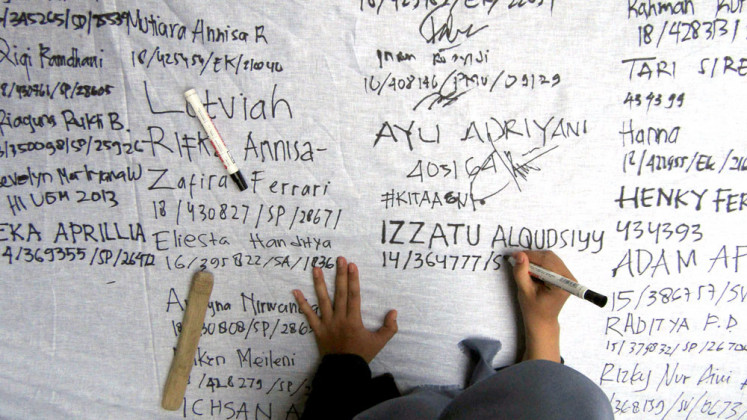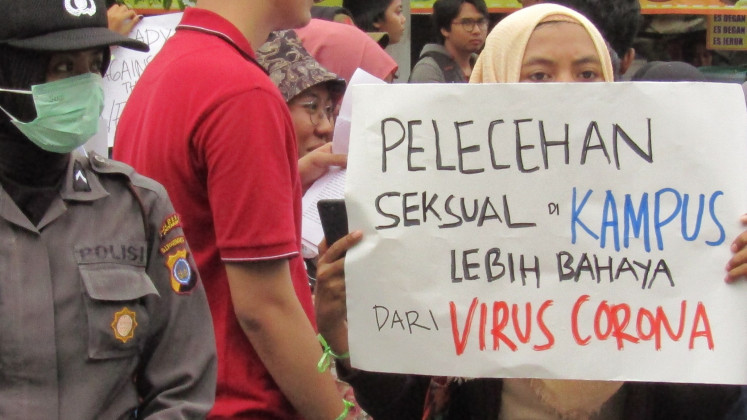Popular Reads
Top Results
Can't find what you're looking for?
View all search resultsPopular Reads
Top Results
Can't find what you're looking for?
View all search results‘Take all the time in the world to heal’: Agni’s message for victims of sexual assault
For Agni, the woman at the center of a national movement to eliminate sexual violence on campus, it has taken a long time for her to tell herself that it was OK not to be OK.
Change text size
Gift Premium Articles
to Anyone
I
ndonesia will always remember Agni as the girl who ignited the fire in the fight against all forms of sexual abuse in the culturally conservative country.
In 2018, it was her story of assault that set off a wave of support and solidarity that gave Indonesia its very own #MeToo moment dubbed #KitaAgni (#WeAreAgni), which has arguably become one of the largest social movements to end sexual harassment that the nation has ever seen.
Two years on, Agni has graduated from university, and while she is still in awe and ever grateful for the positive force that her story has become, she also continues to fight the demons of trauma every single day.
Sitting in her small rented bedroom on a recent Monday, Agni often had to pause and take deep breaths as she recalled just some of the memories of her assault and her efforts to seek justice over the past three years.
Her eyes looked tired.
“I feel very exhausted, to a point where I want to wake up and know that the sexual violence bill has passed; that there’s a guarantee no one will ever have to experience what I feel,” Agni told The Jakarta Post in a recent interview via video conference.
“I want the right to feel safe.”
Read also: Victims of sexual abuse on campus seek justice, support on social media
Agni is the pseudonym of a former female student of Gadjah Mada University who was allegedly sexually assaulted by another student in 2017 during a community development program in the province of Maluku.
After a long and tiring legal fight, Agni and her legal counsel, the UGM rectorate, as well as the alleged perpetrator, HS, settled the case out of court.
HS never got dismissed from the university, as per Agni’s demand. But her story reverberated across the country, inspiring petitions, policies, social movements and discussions to end sexual assault on campuses, not only at UGM but also in other universities in Indonesia.
But even as she remains grateful for all that she helped inspire, Agni never really recovered from her trauma. Currently working in a private company, Agni said any information or news related to sexual assault could become a trigger.
“I live alone now and I struggle every time I have these anxiety attacks; it takes me one to two hours to finally calm myself down. In those instances, I might hyperventilate, my chest would hurt, I’d feel a prickling sensation [on my skin] and my lips would go dry,” Agni said.
She said she was really tired of trying to keep herself from inflicting self-harm. If a security camera were to be installed in her bedroom, there would definitely be a recording of her crawling across the floor in agony.
“I wonder if people will be disappointed to see me like this,” Agni said.
For a while, she stopped talking and stared at her bedroom wall.
A student of Yogyakarta-based Gadjah Mada University (UGM) signs a petition to support Agni, the pseudonym of a UGM student who was allegedly raped by a fellow student in 2017, and to encourage the university to take action against sexual violence on campus. (The Jakarta Post/Bambang Muryanto)“Recently we’ve always used the word ‘survivor’ instead of ‘victim’ to show that we are strong,” she finally continued. “We tend to forget that survivors are first and foremost victims. I want people to know that most of the time I am fearful, I’m tired and I want to give up,” Agni said.
According to a March report from the National Commission for Violence Against Women (Komnas Perempuan), the number of reported sexual violence cases in Indonesia continues to increase, from 259,150 in 2016 to 348,446 in 2017, 406,178 in 2018 and 431,471 in 2019.
The report found that in the last 12 years alone, violence against women in Indonesia has increased eightfold.
However, not much has been said about the impacts of sexual violence on the emotional and mental wellbeing of victims, even though experts say they can be equally serious or even worse than physical scars or bruises.
According to the World Health Organization, one in every three women globally will be beaten, coerced into sex or abused in some other way — most often by someone she knows. Yet public services, such as quality mental health services, are rarely planned with women’s safety, recovery and healing from violence in mind.
As a result of the trauma, many women survivors develop emotional or mental health problems that require timely, comprehensive and professional treatment. But too often, this critical health service is not available or accessible for a vast majority of survivors, especially in low- to middle-income countries.
Read also: Mental health: The forgotten element in human development
For Agni, it took a long time for her to tell herself that it is OK not to be OK.
“My message for other victims is that you should take all the time in the world to heal and that it’s OK to be weak and unapologetic about it. I’m not saying this to make you feel weak or say that you can’t be brave; what I want to say is do it on your own terms,” she said.
“Be strong, but if you don’t feel like being strong, then reach out to your friends.”
Agni said that after her case was closed, UGM never bothered to contact her again, not even to check on her mental health. And under the current laws, victims of sexual assault like Agni are not entitled to get help from the government, including for their mental recovery.
Victims, she said, are never really given the opportunity to recover.
“What we can do is help them go through that [trauma],” she said.
It was, therefore, pivotal to have the sexual violence bill passed, as it would require the government to provide rehabilitation services for victims to overcome the physical, psychological and social impacts of abuse.
“It’s expensive and sometimes the victims don’t realize that they need to recover. If this is well regulated, then […] they’d be directed to it,” she said.
Contacted separately, Lidwina Inge Nurtjahyo, a lecturer at the University of Indonesia’s (UI) School of Law, said that although some sexual assault cases at UI remained unresolved and the university had not done enough to aid in the victims’ recovery, Agni’s story had brought about some major changes in how it addressed sexual assault.
“Agni, like her name, means [in Sanskrit] a fire that lights up the spirits of students and lecturers in universities who are fed up with issues of sexual assault on campus,” Inge told the Post recently.
As a result, she said, the university had started conducting workshops on how to prevent sexual assault, which included familiarizing the concepts of consent and respect for other people’s bodies.
Read also: UI rebuffs criticism of consensual sex class
Agni’s story has also inspired other student movements like UII Bergerak, which seeks to push the Indonesian Islamic University in Yogyakarta to take cases of sexual assault on campus more seriously.
“Agni’s case has raised awareness about the gender struggle, especially in Yogya,” said Sabiq Muhammad, a member of UII Bergerak.
“Antisexual violence causes or cases similar to that of Agni’s used to be an open secret, but since the solidarity movement for Agni began, these discussions have gotten much more attention.”
People march to mark the 2020 International Women's Day in Yogyakarta on March 8. The march raised awareness about the fight against sexual violence at universities in the city. The pictured sign reads: "Sexual assault on campus is more dangerous than the coronavirus." (JP/Bambang Muryanto)Like UGM, many universities and schools have started drafting regulations on sexual assault on campus and included relevant learning materials during campus orientation.
Agni’s case has also inspired news coverage on sexual assault on campus, including the #NamaBaikKampus (#CampusReputation) collaboration.
The project, initiated in 2019 by the Post, Tirto and VICE Indonesia, revealed indications of rampant sexual abuse in the country’s higher education institutions, based on the testimonies of 174 survivors from 79 state, private and religious universities.
As the person at the center of this movement, Agni said she felt there was still a long way to go until women in Indonesia could start feeling safe.
“As long as the government is still absent [in this fight], we will just be exhausting ourselves,” she said.
But she also believes it is progress whenever more victims of sexual assault speak up and reach out for help, even if it is on social media.
“People are ready, they really need this bill […] If they speak up on social media, then they believe somebody will trust them. But these are people on the internet, not the state,” she said.
“Without the sexual violence bill, there will always be a gap between those who muster up the courage to seek justice and the things that can help them reach their goals.”












